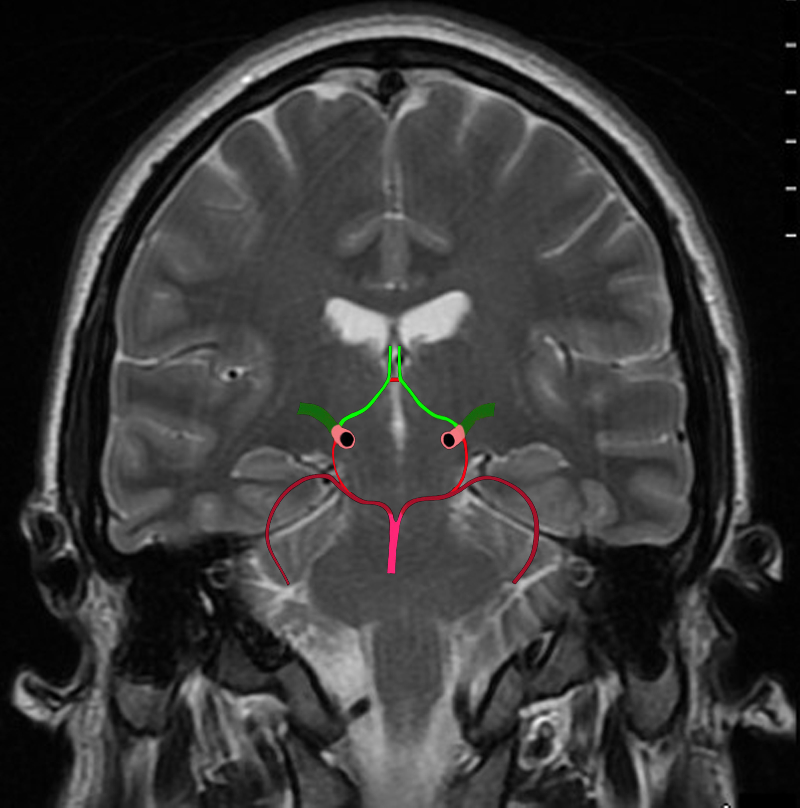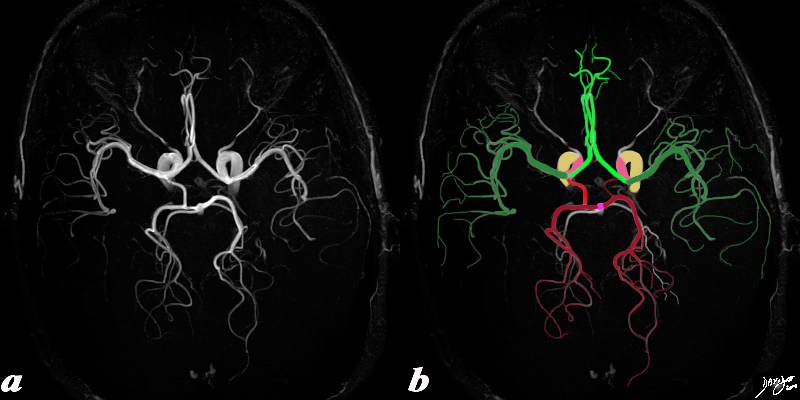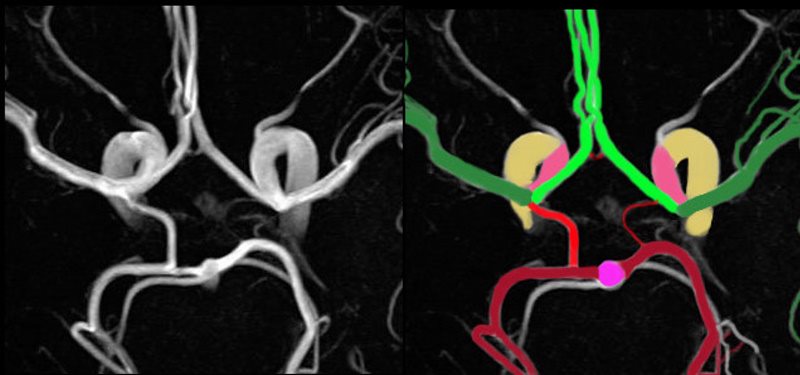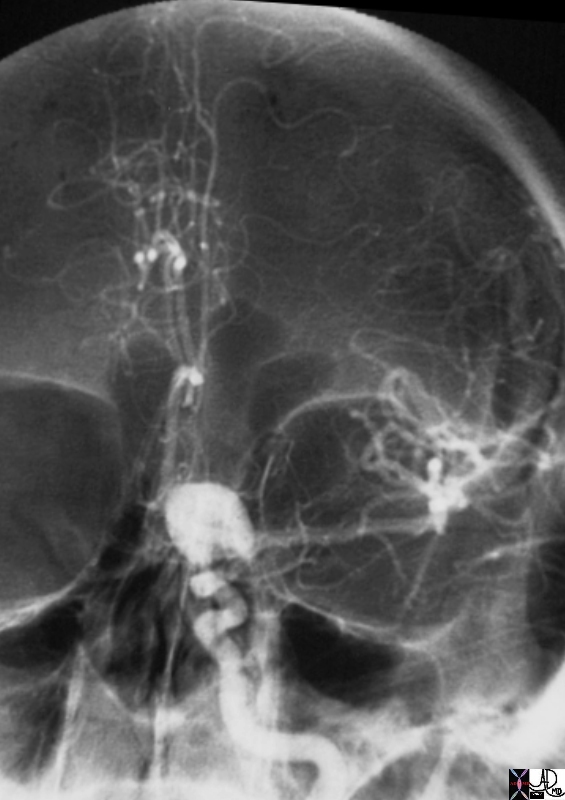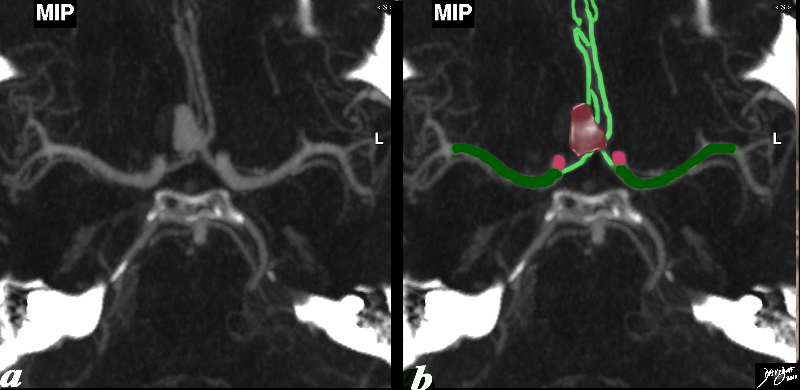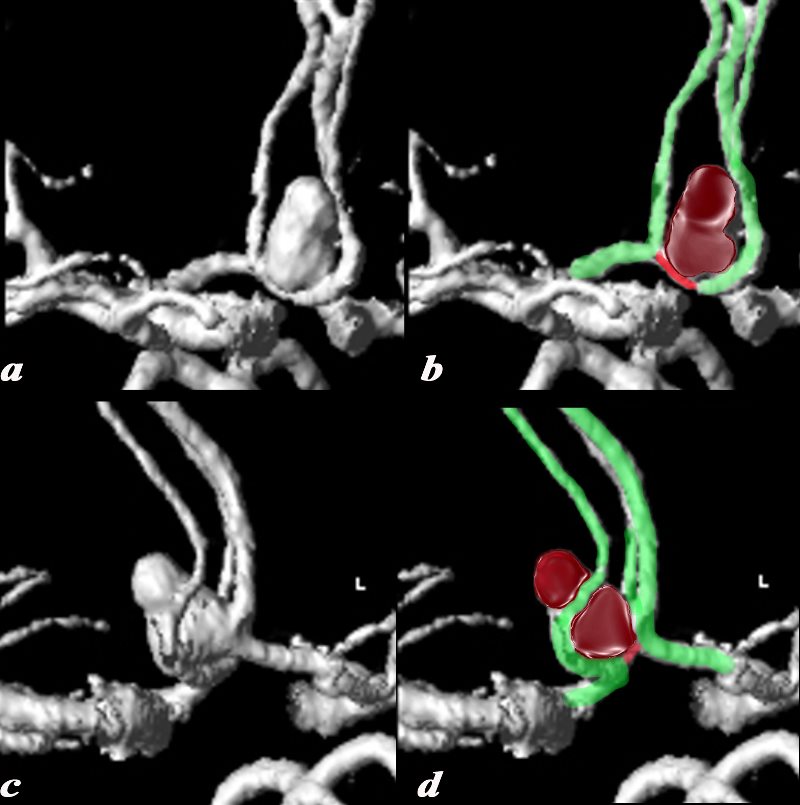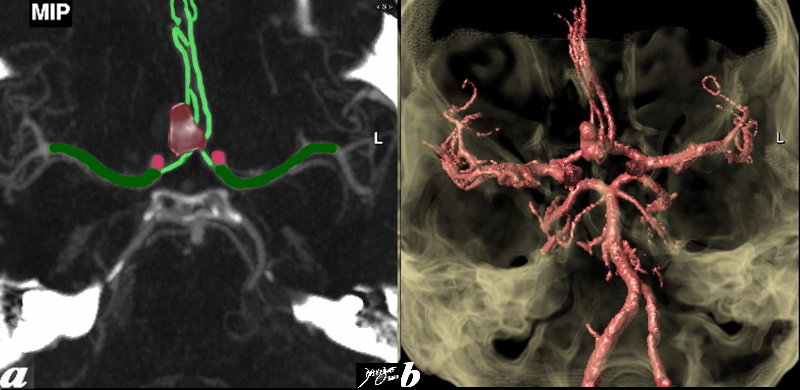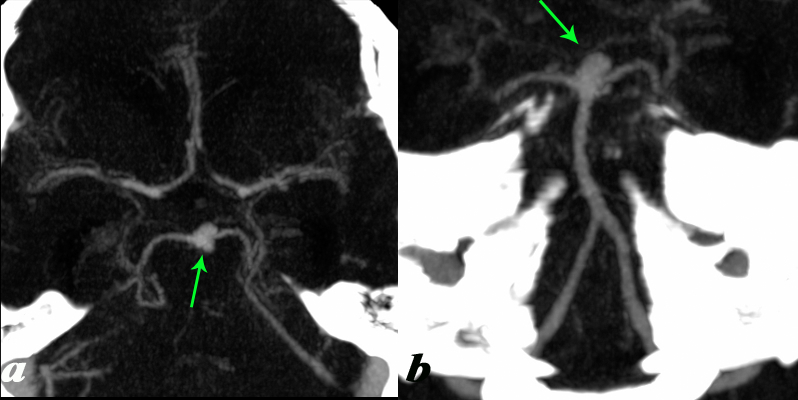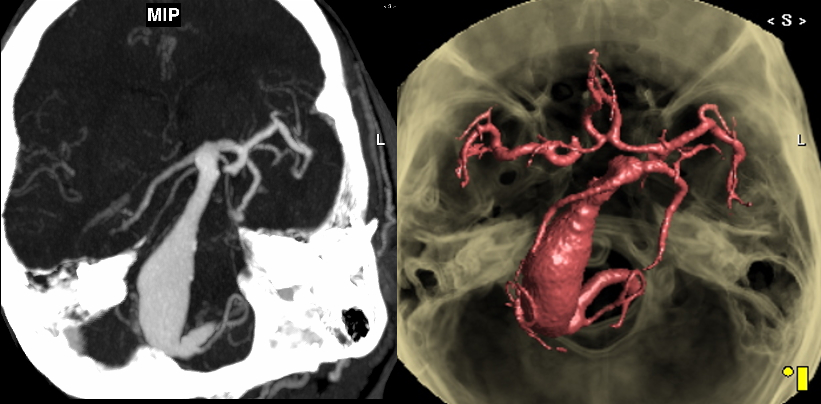Circle of Willis
The Common Vein Copyright 2010
Definition

The Circle of Willis |
|
The cerebral circulation has a unique system that allows for compensatory flow when any one of the 4 vessels is narrowed or occluded. This cerebral circulation is centered on the circle of Willis which has two basic systems that feed it; the carotid system (in this case salmon pink) and the vertebro-basilar system (brighter pink). They both feed into the circle of Willis (bright red) via communicating branches. The middle cerebral artery is the vessel that feeds into the COW by providing the anterior communicating artery and the posterior cerebral artery connects via the posterior communicating artery. Conceptually as depicted in this diagram the circle of Willis is the centre of the cerebral circulation and from it blood flows into the anterior (bright green), middle (darker green) and posterior cerebral (maroon) regions. Image Courtesy Ashley Davidoff MD Copyright 2010 97194b09.8s |

Branches To and From the Circle of Willis |
|
This cerebral circulation is centered on the circle of Willis which has two basic systems that feed it; the carotid system (in this case salmon pink) and the vertebro-basilar system (brighter pink). They both feed into the circle of Willis (bright red) via communicating branches. The middle cerebral artery is the vessel that feeds into the COW by providing the anterior communicating artery and the posterior cerebral artery connects via the posterior communicating artery. Conceptually as depicted in this diagram the circle of Willis is the centre of the cerebral circulation and from it blood flows into the anterior (bright green), middle (darker green) and posterior cerebral (maroon) regions. Image Courtesy Ashley Davidoff MD Copyright 2010 97194b16b.8s |
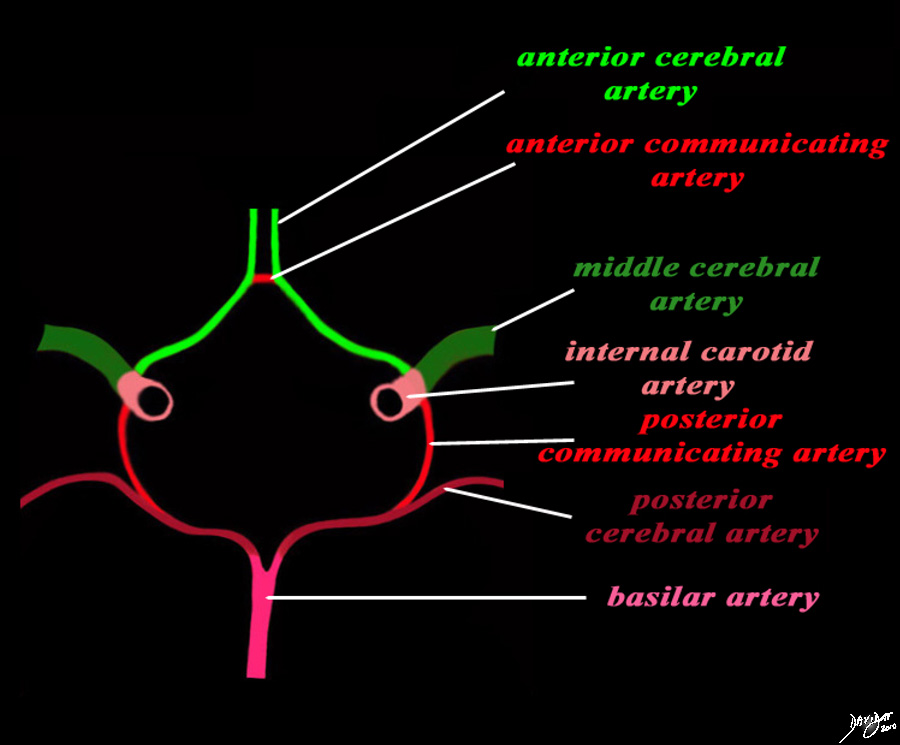
Structures of the Circle of Willis |
|
The diagram shows the main branches of the blood supply to the brain which includes the carotid and vertebro-basilar systems. These are the vessels that particpate in the formationofthe circle of Willis The carotid system supplies the brain from the internal carotid (salmon pink) – a branch of the common carotid which arises from the aorta. Its terminal bifuracation into the middle cerebral (dark green) and anterior green (bright green) are shown. The anterior communicating artery runs between the two anterior cerebrals (bright red) The basilar artery (pink) is formed by the two vertebral arteries and travel as a single artery over the upper medulla and the entire pons. Its terminal branch is the posterior cerebral artery (maroon). Each of the vessels contributes to the circle of Willis through communicating arteries. The vertebro-basilar system provides the posterior communicating arteries bilaterally and the carotid system provides the anterior communicating arteries via the anterior cerebral artery. code brain Courtesy Ashley Davidoff MD Copyright 2010 All rights reserved 97194b13g04L01.91s |
|
The Circle of Willis Overlaid on a Coronal View of the Brain |
|
The diagram shows the main branches of the blood supply to the brain including the circle of Willis overlaid on coronal MRI image to portray the approximate position of the vessels in the brain. The carotid system supplies the brain from the internal carotid we demonstrate its terminal bifurcation into middle cerebral (dark green) and anterior cerebral (bright green). The anterior communicating artery runs between the two anterior cerebrals (bright red) The basilar artery (pink) is formed by the two vertebral arteries and it travels as a single artery over the upper medulla and the pons. Its terminal branch is the posterior cerebral artery (maroon). Each of the carotid and vertebro-basilar systems contributes to the circle of Willis through communicating arteries. The vertebro-basilar system provides the posterior communicating arteries bilaterally from the posterior cerebral and the carotid system provides the anterior communicating arteries via the anterior cerebral arteries. Courtesy Ashley Davidoff MD Copyright 2010 All rights reserved 89721c06b.8sg04.8s |
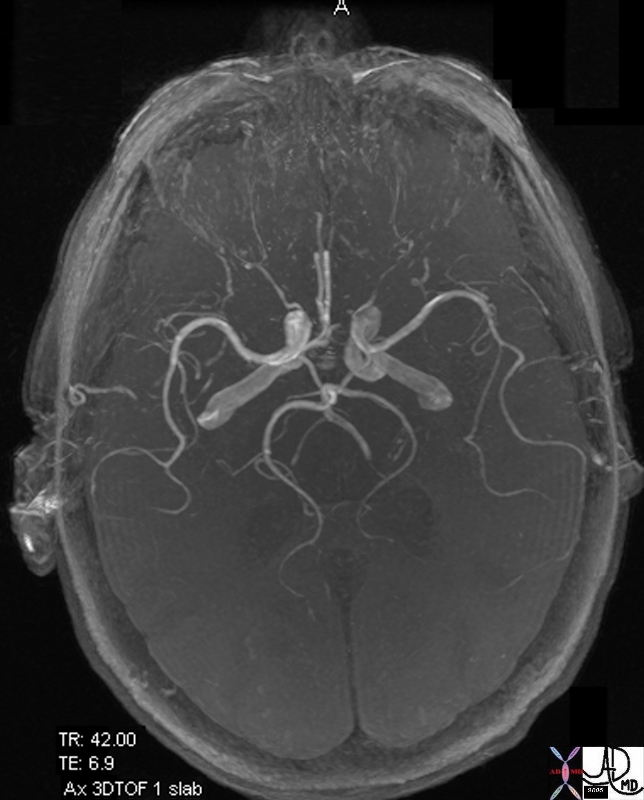
MRA – Circle of Willis Centre of the Brain and the Center of the Circulation of the Brain |
|
The MRA (3D TOF) in axial projection demnonstrates circle of Willis The COW is central to the brain, and central to the cerebral circulation. This concept is well demonstrated in this image 46353 Courtesy Ashley Davidoff MD Copyright 2010 |
|
MRA in Axial Projection Using a 3T Magnet |
|
The axial MRA using 3T magnet shows the circle of Willis overlaid in color to reflect the component vessels. The supraclinoid portion of the internal carotid (salmon pink) divides into the middle cerebral (MCA dark green) and anterior cerebral (ACA bright green). There is a tiny anterior communicating artery (bright red) that runs between the two anterior cerebrals. The basilar artery (bright pink) gives rise to the posterior cerebral (PCA maroon) and superior cerebellar arteries (white) carotid system. The posterior cerebral artery gives rise to the posterior communicating artery which plugs into the region of the origins of the MCA and ACA. Note the left posterior communicating artery is relatively small which is a normal variant. Each of the carotid and vertebro-basilar systems contributes to the circle of Willis through communicating arteries. The vertebro-basilar system provides the posterior communicating arteries bilaterally from the posterior cerebral and the carotid system provides the anterior communicating arteries via the anterior cerebral arteries. Image Courtesy Philips Medical Systems Image Rendered Ashley Davidoff MD Copyright 2010 All rights reserved 92550c01.8s |
|
MRA of the Circle of Willis |
|
The axial MRA using 3T magnet shows a magnified view of the circle of Willis overlaid in color to reflect the component vessels. The supraclinoid portion of the internal carotid (salmon pink) divides into the middle cerebral (MCA dark green) and anterior cerebral (ACA bright green). There is a tiny anterior communicating artery (bright red) that runs between the two anterior cerebrals. The basilar artery (bright pink) gives rise to the posterior cerebral (PCA maroon) and superior cerebellar arteries (white) carotid system. The posterior cerebral artery gives rise to the posterior communicating artery which plugs into the region of the origins of the MCA and ACA. Note the left posterior communicating artery is relatively small which is a normal variant. Each of the carotid and vertebro-basilar systems contributes to the circle of Willis through communicating arteries. The vertebro-basilar system provides the posterior communicating arteries bilaterally from the posterior cerebral and the carotid system provides the anterior communicating arteries via the anterior cerebral arteries. Image Courtesy Philips Medical Systems Image Rendered Ashley Davidoff MD Copyright 2010 All rights reserved 92550c02.8 |
Applied Biology
Anterior Communicating Artery Aneurysm
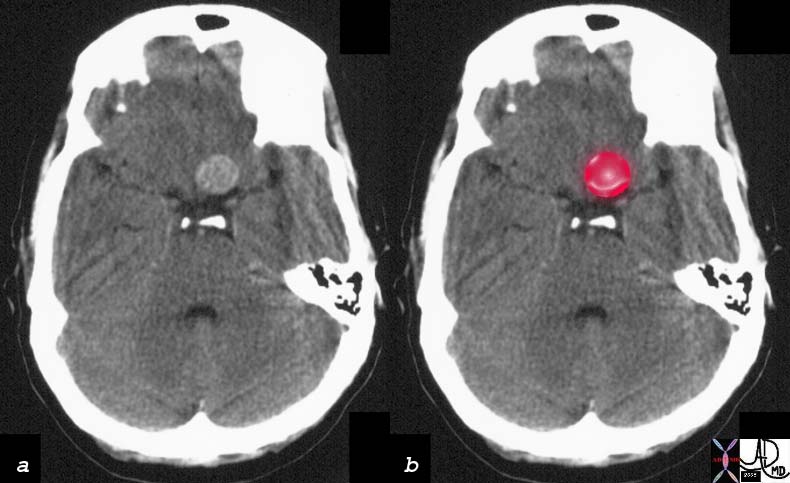
Aneurysm of the Anterior Communicating Artery |
|
The CT with contrast in axial projection shows an enhancing aneurysm in the region of the circle of Willis that was shown to arise from the anterior communicating artery. See angiogram below Courtesy Ashley Davidoff MD 16004c01 |
|
Anterior Communicating Artery Aneurysm |
|
The angiogram in the A-P projection shows the aneurysm in the region of the circle of Willis. The aneurysm arose from the anterior communicating artery. The middle cerebral artery appears normal. Both anterior cerebral arteries fill suggesting that the anterior communicating artery is patent. 16006.800 Courtesy Ashley Davidoff MD |
|
Anterior Communicating Artery Aneurysm – CTA |
|
The CTA through the circle of Willis shows an aneurysm in close association with the anterior cerebral arteries (bright green). It appears to lie between the anterior cerebral arteries and likely represents an aneurysm of the anterior communicating artery. The distal internal carotid is seen in salmon pink while the middle cerebral artery is overlaid in dark green. Image courtesy Philips medical Systems Image rendering Ashley Davidoff MD Copyright 2010 92577c01b8 |
|
3D Volume Rendering of the Aneurysm Enabling Identification of the Anterior Communicating Artery |
|
The CTA through the circle of Willis with 3D volume rendering shows an aneurysm in close association with the anterior cerebral arteries (bright green). These views allow the visualization of the anterior communicating artery (red) confirming that the origin of the aneurysm is in fact from the anterior communicating artery. The 3D views allow more definitive evaluation of the origin of the aneurysm Image courtesy Philips medical Systems Image rendering Ashley Davidoff MD Copyright 2010 92577c04.8s |
|
Aneurysm in Contextual Perspective |
|
The CTA through the circle of Willis shows an aneurysm in close association with the anterior cerebral arteries (bright green). It appears to lie between the anterior cerebral arteries and likely represents an aneurysm of the anterior communicating artery. The distal internal carotid is seen in salmon pink while the middle cerebral artery is overlaid in dark green. Image b shows 3D volume rendered anterior and posterior circulation in the context of the base of the skull giving a contextual perspective of the aneurysm. Image courtesy Philips medical Systems Image rendering Ashley Davidoff MD Copyright 2010 92577c.81 |
Aneurysm of the Basilar Artery
|
Basilar Tip Aneurysm |
|
The axial (a) and coronal (b) image of the vertebro- basilar circulation looking into the middle and posterior cranial fossa with the circle of Willis in view shows a basilar tip aneurysm. Courtesy Philips Medical Systems 92584c |
|
Fusiform Aneurysm of the Basilar Artery |
|
The MIP (left) and 3D volume rendered (right) image of the vertebro- basilar circulation looking into the middle and posterior cranial fossa shows a diffuse fusiform aneurysm of the basilar artery. Courtesy Philips Medical Systems 92415c.8 |

